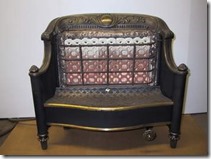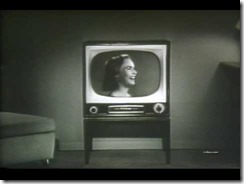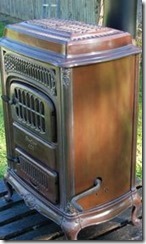
I was reminded, while reading “
Life on a Colorado Farm”
a couple days ago, just how much the country has changed in a few
decades. Conspicuous in its absence, the front porch; once the center
piece of communities, it is becoming a rare sight as the older homes
disappear behind time’s unforgiving hands.
The era is post World
War II. The economy is growing; the US dollar value is strong. Jobs,
paying good wages earned in the newly acquired union manufacturing
sector, the rapidly expanding railways, and burgeoning government
bureaucracies are increasing middle class wealth as never before in the
nation.
Life is good; mom and dad no longer have to work sun-up to
sun-down just to keep the family fed; they now have time for something
very rare prior to this era – leisurely activities.
New technology
is appearing daily. New family traditions are being forged; the large
dining rooms and tables where family members gather (
always a required gathering) to eat their evening meals (
be it supper or dinner) and interact, sometimes in reverence, most often raucous.
With
five siblings, reverence is not typically on the evening menu in my
family. But, if it gets out of hand, we are often promised a different
hand - one to the backside; a promise never broken. The trick is always
knowing precisely what “out of hand” is on any given evening. Gauging
moods is primary to survival.
On freezing winter nights, with bowls of popcorn in hand, we gather, enjoying the warm glow of the latest in high-tech heaters.

The nightly news with David Brinkley and Chet Huntley is just ending and (
still keenly aware of the promises made at the supper table) we jockey for viewing positions in front of the new form of entertainment; the television.

[embed]https://www.youtube.com/watch?v=TLnBgUH77oA&list=PL33BAA33D96D5AE6E&index=7[/embed]
Yet,
as important to new family life all this is, the front porch reigns
king; a place for mom and dad to sit, sleepily watching the children and
pets play in the yard.
Siting on their respective front porches, drawn
outdoors by fresh spring air, everyone watches with trepidation as
spring storms gather on the not so distant horizon. In the now hidden
line between earth and sky, lightening flashes momentarily illuminate
the clouds, amplifying the anger within the mammoth, gray-black
monsters, and distant thunder slowly makes its way to the spectators;
muffled explosions warning us not to take lightly, the power and whims
of Mother Nature in the plains states.
More than just an
architectural element of appearance, the front porch is an extension of
the home which has existed since early Colonialism in the Americas.
Certainly not entirely new, but they became a standard by which all
homes were modeled in post American Civil War. In the mid-19th Century,
it was likely considered sheer insanity to build a house without one
and it remained so for over one-hundred years after the War.
After all; who would want a house without a front porch?
Too
hot indoors, the entire neighborhood lingers on and around their front
porches, quietly pleading for a soft summer breeze to cool them in the
stifling hot, humid afternoons. As blue jays scream, and woodpeckers
hammer the trees in the milder warmth of late summer evenings, all the
fun begins experiencing brief moments of pain; thoughts of school tries
to interrupt what’s truly important and they are pushed back into the
perfect location within all childhood minds – the realm of now; only
this moment is forever.
In the August heat, the front porch
becomes even more of a focal point for family and neighbors as they seek
the relative coolness of outdoors. Relaxing while enjoying an ice tea,
Dr. Pepper, or lemonade, the neighborhood is hypnotized by the
deafening buzz of cicadas.
Those front porches served many roles;
an open invitation into the lives of the home’s occupants; a place to
welcome the mailman, paperboy and milkman delivering their goods, and
even a place for the somewhat less welcome – Hoover, Jewel T,
Encyclopedia Britannica, and Fuller Brush salesmen peddling their wares.
The
front porch played a vital role in forming our communities. Lives
revolved around them; families still maintained their connection to the
outdoors as in the days of farming, and they did so with the neighbors.
And, the neighborhood seemed to extend to corner grocery stores like my
father’s, where I would, on most days, be found before and after
school.
Winters are brutally cold in Oklahoma; bitter-cold wind
constantly howls, blowing a chill through the body like an icy knife
rattling the bones. And, as if that isn’t enough to remind one it’s
winter, invisible flying needles sting your skin the second you leave
the protection of indoors. Ice forms on everything; icicles hang from
the Moon, the basement window sills, and virtually all that lies
between.
Grocery deliveries to the customers in small, sleepy,
Shawnee, Oklahoma were a losing battle with those brutal winters, but
the embattled was quickly warmed away by siting on the open grates of
yet another high-tech heater.

The hot seat was never to feel so good again.
Things
were happening in this little grocery store; things only semi-related
to selling groceries, but they were indeed magical. Intangible, maybe
even approaching transcendental things, they were profoundly vital to
the health of the community; of the nation.
Warming themselves
using the same life-giving force I frequented, the mailman; bread, meat,
and milk delivery men; truck drivers delivering canned goods and most
enjoyable, the customers all gathered around the heater to talk, conduct
business, and even to gossip. Our front porch had extended itself to
the corner grocery and beyond, to the neighborhoods from which each
participant came.
I had no way of knowing it at the time, but I
was witnessing a dying social phenomenon that would have, inarguably, a
profound affect on not just families, but the entire nation.
Perhaps it’s inevitable; perhaps traditions are nothing more than
temporary perceptions, changing with time. Whatever they were, they're
all but gone now; the large required gatherings around the supper table;
front-porch days when families gathered and the corner grocery where
all communed; all but vanished.
Large
corporations soon steam-rolled all small mom and pop businesses;
the corner grocery stores died, leaving shells of dilapidated buildings
falling around their foundations; children began leaving, venturing to
the cities to find work in those large corporations, leaving the
neighborhoods to crumble to a likewise dwindling collection of antiques.
Old heaters, old communities; old people, slowly rusting into memories.
As families disperse and communities disappear, new technologies appear daily, and new family traditions are forged.
Houses
no longer have front porches; moms, dads and children have migrated to
the back yard, or into the house to stay. Away from view and out of
touch with even those in houses less than thirty feet away, we are
strangers to our neighbors. And to ourselves!
We no longer share
ideas and discuss events; we no longer share life as a community.
Rather, with our new-found technology and isolationist sarcasm we
“post” comments to one another’s writings on line, acidly attacking
everyone who isn’t the preferred flavor of the day, all while
maintaining anonymity behind an avatar and a pseudonym.
But for a
few antiques, the front porch has vanished. Gone with it are the
parents and children socializing out in the open for all to enjoy and
with which to grow. Gone too, are the corner grocery stores; no more
magical heaters benefiting from the extended front porch.
In an
inescapable irony, mom and dad must now work longer hours, even multiple
jobs, working sun-up to sun-down just to keep the family fed; a once
treasured event has turned into something now very rare –
leisurely activities.
Perhaps it’s inevitable. But, then perhaps not.















